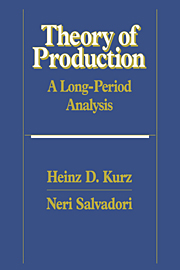Book contents
- Frontmatter
- Contents
- Preface
- A reader's guide
- 1 Free competition and long-period positions
- 2 A one-commodity model
- 3 Two-commodity models
- 4 Models with any number of commodities
- 5 Choice of technique
- 6 Alternative descriptions of a technique
- 7 Fixed capital
- 8 Joint production
- 9 Jointly utilized machines
- 10 Land
- 11 Persistent wage and profit rate differentials
- 12 On limits to the long-period method
- 13 Production as a circular flow and the concept of surplus
- 14 The neoclassical theory of distribution and the problem of capital
- 15 On some alternative theories of distribution
- Mathematical appendix
- References
- Name index
- Subject index
2 - A one-commodity model
Published online by Cambridge University Press: 06 January 2010
- Frontmatter
- Contents
- Preface
- A reader's guide
- 1 Free competition and long-period positions
- 2 A one-commodity model
- 3 Two-commodity models
- 4 Models with any number of commodities
- 5 Choice of technique
- 6 Alternative descriptions of a technique
- 7 Fixed capital
- 8 Joint production
- 9 Jointly utilized machines
- 10 Land
- 11 Persistent wage and profit rate differentials
- 12 On limits to the long-period method
- 13 Production as a circular flow and the concept of surplus
- 14 The neoclassical theory of distribution and the problem of capital
- 15 On some alternative theories of distribution
- Mathematical appendix
- References
- Name index
- Subject index
Summary
In this chapter the mathematical properties of a model in which only one commodity is produced by means of itself and homogeneous labor will be studied. While this model is exceedingly simple from the mathematical point of view, it is difficult from the conceptual one. The economic system contemplated is a highly abstract one in which it is assumed that only one commodity is produced; it is assumed that this commodity is produced by means of itself and homogeneous labor. The only relative price dealt with is the real wage rate. This model is introduced for illustrative purposes only. However, several of the concepts developed in this chapter and some of the results derived carry over, with some modifications, to the more general models dealt with in the subsequent chapters.
The structure of the present chapter is as follows. In Section 1 the technical conditions of production are described and discussed. Section 2 introduces the concept of viability. Section 3 deals with growth and consumption opportunities, Section 4 with the distribution of the product between workers and capital owners. Two alternative views concerning the connection between the growth–consumption and the wages–profits aspects of the system under consideration are discussed in Section 5, in which saving and investment behavior is introduced. Section 6 is devoted to the problem of the choice of technique. Section 7 deals with alternative conceptualizations of the relationship between distribution and growth.
- Type
- Chapter
- Information
- Theory of ProductionA Long-Period Analysis, pp. 42 - 57Publisher: Cambridge University PressPrint publication year: 1995



